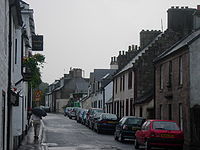Inverkip
Inverkip
|
|
|---|---|
 Inverkip's Main Street |
|
| Inverkip shown within Inverclyde | |
| OS grid reference | NS 20675 71938 |
| Council area | |
| Lieutenancy area | |
| Country | Scotland |
| Sovereign state | United Kingdom |
| Post town | GREENOCK |
| Postcode district | PA16 |
| Dialling code | 01475 |
| EU Parliament | Scotland |
| UK Parliament | |
| Scottish Parliament | |
Inverkip (Scottish Gaelic: Inbhir Chip) is a village and parish falling within the Inverclyde council area and historic county of Renfrewshire in the west central Lowlands of Scotland. It lies about 4 miles (6.4 km) southwest of Greenock on the A78 trunk road. The village is served by Inverkip railway station, on the Inverclyde Line.
Inverkip was made a burgh of barony before the Act of Union in 1707, with the parish containing all of Gourock, Wemyss Bay, Skelmorlie and part of Greenock. Inverkip Parish Church dates from 1804 and is near the site of an earlier (twelfth century) kirk. The graveyard contains the tomb of the chemist Dr. James "Parrafin" Young who was nicknamed 'Paraffin' because of his pioneering work in oil technology. He lived at nearby Kelly House, which burnt down in 1913, the report laying blame with the suffragettes.
The parish of Inverkip's chief claim to fame (or notoriety) was in relation to witches in the mid 17th century. A local verse recalls
"In Auld Kirk the witches ride thick
And in Dunrod they dwell;
But the greatest loon amang them a'
Is Auld Dunrod himsel'."
'Auld Dunrod' was the last of the Lindsay family of Dunrod Castle. As the result of a dissolute life he lost all his possessions and fell into the black arts. Local reputation had it that he was in league with the devil, and he died in mysterious circumstances in a barn belonging to one of his former tenant farmers. Nothing now remains of the castle which stood at the foot of Dunrod Hill.
...
Wikipedia

